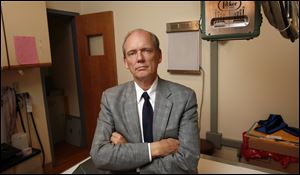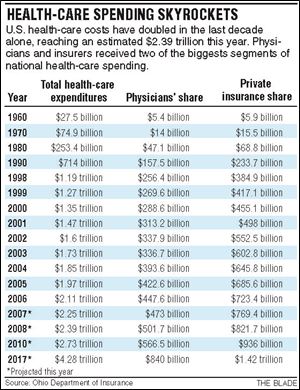
NOT WHAT THE DOCTOR ORDERED
Patients' Bill of Rights may help solve care concerns
8/27/2008
Dr. Dorothy Levine lets Katherine Squillante, 3, listen to her 8-month-old sister Caroline’s heartbeat in Connecticut. Dr. Levine says the national health-care debate is too superficicial.
THE BLADE/JEREMY WADSWORTH
Buy This Image
Last of four parts

Dr. Michael Connair of Connecticut got fed up with insurers and is attempting to organize doctors across the country
COLUMBUS -- Ohio Gov. Ted Strickland is still haunted by the memory of Patsy Haines, who died nearly seven years ago after a long battle with leukemia.
The woman’s doctors felt she needed a bone-marrow transplant, and her brother was a match, but her insurer wouldn’t pay because it considered the operation experimental. Mr. Strickland, then a congressman serving southeastern Ohio, joined the woman’s fight and sought help in Columbus and Washington - but he couldn’t get the transplant approved.
Ms. Haines, 31, of Hillsboro, Ohio, waited nearly two years - and only after qualifying for the procedure under Medicare - before she received the transplant. But a few days later, she died.
“I went to her funeral and they were singing hymns and the preacher was preaching and praying, and I sat there thinking to myself that this young woman may have died unnecessarily,” said Mr. Strickland, now Ohio’s governor, during a recent interview with The Blade in his Statehouse office.
Since Ms. Haines’ death, Governor Strickland has used her as an example of how the health care system is failing people and doctors’ are being stymied in caring for their patients.
An eight-month Blade investigation, including interviews with about 100 physicians in a dozen states and a national survey of doctors with more than 900 responses, revealed that a growing number of doctors believe there’s an epidemic of insurers interfering with medical-treatment decisions.
READ THE SERIES: Not What The Doctor Ordered
Physicians in the survey and in interviews expressed the same worries that their clinical decisions are increasingly overruled by insurers, at times harming their patients.
Ninety-nine percent of the 920 respondents to The Blade’s survey of Ohio State Medical Association and American Medical Association members indicated insurers interfered with some aspect of their treatment plans for patients. The associations sent The Blade’s online questionnaire to their members.
In reacting to The Blade’s investigation, Governor Strickland recalled efforts in Congress in the late 1990s and early 2000s to pass a federal Patients’ Bill of Rights.
“I think had we done that, some of the issues that you have uncovered in your investigation would not be as prominent within the system today as they seem to be,” the governor said.
The Patients’ Bill of Rights - which provided a number of guarantees for patients including access to treatment and continuity of care - died after partisan disagreements over whether patients should be allowed to sue their insurers.

Support pledged
Efforts to revive the federal patients’ bill of rights have been shelved in the halls for Congress for years, but top advisers to Sens. John McCain and Barack Obama, the presumptive Republican and Democrat nominees for president, reacting to The Blade’s investigation, say they would support such a proposal.
Senator Obama plans to go even further than calling for a patients’ bill of rights, said Neera Tanden, his domestic policy adviser.
“Senator Obama feels that patients deserve more protections than the patients’ bill of rights, not fewer,” Ms. Tanden said in an interview, noting that his plan bans insurers from turning away patients because of pre-existing conditions.
Within his broader plan to offer affordable insurance to all U.S. citizens, Mr. Obama wants to guarantee that patients already insured are getting what they pay for in premiums. He proposes using “bottom line regulation” of the insurance market to make health plans more accountable.
“One of the real tragedies of our health-care system is that people who have had health insurance, have done all the right things, have paid their premiums, they pay their co-pays when they see their doctors, and when they need it most, the coverage isn’t there,” Ms. Tanden said. “That’s what’s creating a lot of anxiety in the health-care system.”
Senator McCain’s health plan calls for creating more competition among insurers and by giving individuals, through tax credits, the ability to purchase their own health plans.
“He would change the nature of the relationship so even if an insurance company has the power to interfere, they would no longer have the incentive to,” Doug Holtz-Eakin, the senior policy adviser for the McCain campaign, said in an interview.
Mr. McCain’s plan is designed to make insurers compete for the business of patients - offering an incentive for health plans to provide quality coverage.
“The reason they intervene now is because they make money by cutting off either people or treatments, and we want to people to make money by delivering good health care and that’s the purpose of the reforms,” Mr. Holtz-Eakin said.
Some state legislatures, after waiting for solutions from the federal government, have implemented laws that impact the ways patients, doctors, and insurers interact.
Earlier this year, Governor Strickland signed into law a bill mandating uniform standards in doctor-insurer contracts to clarify compensation and banning the renting or selling of a doctor’s contract by an insurer to another company without permission - eliminating what doctors call “silent PPOs.”
In Colorado, lawmakers passed 11 health-care bills, some of which addressed concerns about the doctor-patient relationship. One law now requires standardized ID cards for patients, helping health-care personnel easily determine their coverage.
The laws are designed to crack down on misleading insurance policies, make it easier to shop for insurance, and require prompt payment. Another new law requires most health plans to cover screening for colorectal cancer.
To U.S. Rep. Marcy Kaptur (D., Toledo), even more will need to be done on the state level to manage the issues facing patient care.
“One of the real complexities in the current system is that fact that we have 50 states, each with their own set of regulations, governing insurance,” said Miss Kaptur, noting that much of the lobbying done by medical societies happens on the state level. “You have to fight your battles at the state level and it really makes it very complex because it means you have to fight 50 battles rather than one at the federal level.”
While U.S. Sen. George Voinovich, a Republican, declined through his spokesman to be interviewed for this series, Ohio’s junior U.S. senator, Sherrod Brown, a Democrat, said the federal government must do more to protect the doctor-patient relationship under any reform proposal.
“My office hears from constituents all the time who have seen insurance companies deny care, have seen insurance companies do everything but march into the hospital or doctor’s waiting room and try to cut off their conversation,” said Senator Brown, whose father was a family physician. “The insurance companies have been far too intrusive in violating what should be a sacrosanct doctor-patient relationship.”
The contracting issue
One area where doctors have taken their battles directly to the federal government is contracting.
Under federal laws, doctors may not share with each other information about their fees. But insurers routinely - and legally - share information about what they pay doctors.
Doctors believe they are at a disadvantage in negotiating their contracts with insurers, putting their patients at risk.
Dr. Michael Connair, an orthopedic surgeon in North Haven, Conn., who grew up in a Republican family, never envisioned himself a card-carrying union member, let alone a labor organizer.
But Dr. Connair, the son of a GOP state senator, joined the doctor labor movement after he became fed up with insurers essentially forcing physicians to accept the terms of their contracts. Dr. Connair, like many physicians, believes that doctors deserve the right to be able to collectively bargain, just like electricians, autoworkers, or steelworkers. Working as a vice president of the Federation of Physicians and Dentists, a labor union for privately employed physicians, he’s attempting to organize doctors across the country, including Ohio.
Governor Strickland said in an interview with The Blade last month that he would be intrigued by the ideas of allowing doctors to form unions.
“I think it could be helpful to the physician community in operating on a level playing field,” Mr. Strickland said. “I don’t think they are operating on a level playing field now.”
Bruce Kelly, the director of Government Relations for the Minnesota-based Mayo Foundation, works with the Mayo Clinic Health Policy Center, which has been studying solutions to the nation’s health-care crisis.
“It is fixable, it is going to take time and it is going to take some changes,” said Mr. Kelly, who has worked with Mayo for 18 years.
Mr. Kelly said the patient should be at the center of any discussion on how to fix health care and who foots the bill.
“The best way to provide care for patients is to create value for patients, better safety, better service,” Mr. Kelly said. “And one of the main ways of doing all of this is to coordinate.”
The coordination includes doctors, insurers, employers, and patients working together, Mr. Kelly said, adding there are “roles for insurers beyond paying the bills.”
“That’s where insurance companies could play a significant role, a positive role, in making part of the insurance plan a care coordination model for the patients that they insure,” Mr. Kelly said.
“It is a different approach when you think of the insurer as somebody you want to partner with [and] somebody who wants to do a better job for their beneficiaries,” he added.

Dr. Dorothy Levine lets Katherine Squillante, 3, listen to her 8-month-old sister Caroline’s heartbeat in Connecticut. Dr. Levine says the national health-care debate is too superficicial.
‘I’m very worried’
Dr. Dorothy Levine, a pediatrician in Connecticut, said much of the national health-care debate has been too superficial, sidestepping many of the problems facing medical care.
“I’m very worried about the fact that the health-care conversation in America is all about putting 44 million more people into the system, which is certainly all well and good for the 44 million who right now don’t have reliable access, “ Dr. Levine said. “But what nobody is talking about is if the system isn’t shored up with more finances and more access to providers, you are just going to dilute things further and you are going to have a lot more miserable people, who now are insured but the insurance isn’t covering them, and the waits are long, and the visits are short.
She added, “It seems like a very superficial election-year conversation as opposed to figuring out what we are going to provide, who is going to provide it, and how it is going to be there when people need it. I don’t hear anybody taking that approach.”
A matter of balance
Experts agree that striking the correct balance between the needs of doctors, patients, employers, and insurers won’t be accomplished easily and quickly.
And in the meantime, doctors are looking at other careers.
“Medicine is slipping as a profession,” said Regina Herzlinger, a leading health-care expert and the author of Who Killed Health Care?
When Ms. Herzlinger began teaching at Harvard Business School 35 years ago, there were only one or two physicians in each year’s class of graduate students.
“There are now 50 and I am certain that we will shortly have even more,” Ms. Herzlinger said.
Ms. Herzlinger said most of the physicians enrolled at Harvard Business School are fully trained. One student, for example, was a cardiac-pediatric-anesthesiologist.
“He finished training and he felt he had to go to Harvard Business School and maybe leave medicine,” Ms. Herzlinger said. “When I say to them, ‘Why are you doing this?’ They say, ‘I cannot practice medicine. There are so many constraints, not only financial, but professional constraints on my ability to be a doctor. I just can’t do it.’ ”
Ms. Herzlinger, who favors a consumer-driven health-care system in which patients have more discretion over their health plan, believes doctors need to be smarter about how they handle the business of caring for their patients in order to restore their power. She advocates for doctors’ overcoming their historical fragmentation by bundling their services into affordable packages.
“They have to quit moaning and get back to the business of figuring out what is the most cost-effective care they can give their patients,” said Ms. Herzlinger.
If doctors’ don’t act quickly, the consequences could be significant, she added.
“They are turning into blue-collars workers,” Ms. Herzlinger said. “Blue-collar workers are fantastic, but medicine is not a blue-collar job. ... We need very creative people with a lot with great memories and ability to correlate A and B. It is not a road job, but that’s what it is turning into.”
Frustrations cited
Dr. Robert Hughes, an ear, nose, and throat doctor from Queensbury, New York, has grown weary of fighting insurance companies over issues surrounding patient care that have no direct benefit to the patient.
“The total loss of control, the corporatization, the unfunded mandates, big overhead - that’s been a frustration to most of us,” Dr. Hughes said. “A lot of things are taking away from the satisfaction of being a doctor. The doctor-patient relationship is the biggest.”
Dr. Hughes comes from a family of physicians, in which the honor of the profession was professed by his parents and siblings. Both of his parents are doctors, as are his three brothers and three sisters. He had a vision of being a doctor, watching both of his parents enjoy their careers and treating their patients.
“Growing up in medicine, I was born to believe there was a lot of tradition,” Dr. Hughes said. “That has been blown to pieces.”
Contact Steve Eder at:
seder@theblade.com
or 419-304-1680